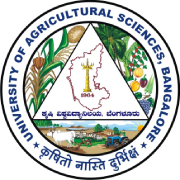
Progress of Biofuel Park Hassan
- Location / Address : Biofuel Park,
Madenur, Hassan.
- Contact details : Project coordinator
Biofuel Park, Madenur, Hassan
- No. 9449857796
Email.biofuelparkhassan@gmail.com
Website: www.biofuelpark.com
- Area of Biofuel Park : 7 ha
- MoU signed between UAS and
KSBDB for execution of Biofuel Park : 2010
India consumes petroleum products annually worth Rs. 7-8 lakh Crores, including 40 million tones of diesel. It is ranked fifth after the US, China, Russia and Japan, among top fossil fuel consuming countries and 5th largest emitter of CO2 in the World. Rapid international exploitation of fossil fuels and plateauing of domestic crude oil output have compelled the search for indigenous, renewable and viable alternate source of energy, leading to focus on biodiesel.
The University of Agricultural Sciences, Bengaluru, developed a systematic, comprehensive and unique Biofuels programme, complimentary to farming activities. The concept of Biofuels for rural energy independence and the strategy adopted to incorporate it in agricultural system are unique. Identification of appropriate plant species was given utmost importance. The team of scientists travelled across the state and identified candidate plus trees of different non-edible oil yielding species of Honge, Neem, Jatropha, Mahua and Simarouba exhibiting high seed yield and oil contents. Identified lines of these species were multiplied and made available elite planting material to farmers and institutions. Research activities in several directions are in progress and are successful in implementing many programs complementary to the activities.
As a pioneer in introducing the concept of Biofuels in farming system of Karnataka, the University of Agricultural Sciences, Bengaluru established the mega project “Biofuel Park”, which is the center of excellence, with the key objectives of developing pathways and programmes to attract farming community to take active role in the biofuel mission.
VISION
To look forward for a green, healthy, pollution free environment, to strengthen the nation, make it self reliable in fuel industry and to gift the future generation with eco-friendly, replenishable fuel resource.
MISSION
To develop a decentralized people oriented model system and strategies for the production of biofuels.
To provide knowhow on biofuels from lab to layman’s platform and educate him regarding long-term advantages of biofuels.
To provide end to end solutions for biofuel programs with appropriate technologies and market network.
OBJECTIVES OF TH PROGRAMME
- Develop a strategy for successful biofuel programme.
- Develop and Provide technology and model for production of biofuels across the state.
- Motivate farming and other sectors to take lead roles.
- Replicate practices and programmes to involve community for participation on a large scale.
- Adopt appropriate sustainable technology and paths to achieve the goals.
- It is a Model developed to encompass and fulfill aims and objectives of thrust areas of Biofuels, extending the activities to all other districts of Karnataka and make biofuels a sustainable option. Biofuel Park has completed five years. It is successful in achieving the set objectives of conducting research in identifying elite lines, standardization of protocols and methods of trans-esterification of oils, designing oil expellers, decorticators, trans-esterification units, creating awareness among farming community, conducting training programs, setting up nurseries of elite lines, providing planting material and arranging planting in identified land areas, and so on.
The following strategies were planned and implemented to achieve the objectives of the programme.
- Identify different species having potency to be source of biofuel.
- Promote the buildup of resource base of multiple biofuel species across the district and state as this helps in prolonging the supply of feed stock for most parts of the year.
- Utilization of marginal, waste lands, bunds, back yards etc for planting diverse biofuel species identified for different areas, without affecting agriculture.
- Use of multi feed stock suitable for oil extraction, tans- esterification, testing and growing of species suitable for different regions, with focus, on growth, seed yield, oil contents etc.
- Participation of the rural community.
- Establishment of market network on the lines of milk producers’ union.
- Value addition at village and panchayath levels.
- Inter face of the user groups-creation and interaction.
- Providing technology support at all levels starting from supply of quality planting material to biofuel production.
EFFECTIVE INFORMATION SYSTEM
The information was given to the farmers at their doorstep by a group of Field investigator.
- 2130 villages in Hassan district was covered for data inventory.
- 2560 awareness meeting held at villages of Hassan district and Madenur center.
- 1865 Training programs held at villages of Hassan district
- 579 Traiing programme held at Biofuel Park.
- School children were also involved in motivation programmes.
- About 1,34,364 farmers and interested people participated in the program with around 50% accounting for women participants.
- 70 villages designated as Complete Biofuel Village with every household planting a biofuel species.
- 482 oil seeds growers and collectors association formed.
BIOFUEL/TREE PLANTING AND NURSERY ACTIVITIES
- 16,93,000 seedling of Honge, Hippe, Neem, Simarouba, Jatropha, Amoora and Surahonne planted in bunds, margins, wastelands, ravines and community lands. Equivalent Area covered is 20,112 acres in Hassan district.
- A model nursery of identified plus trees of Honge, Neem, Jatrooha, Hippe Amoora and Surahonne is established at Biofuel Park.
- Grafting techniques were adopted to produce quality planting material and to get higher yields, within shorter time.
DESIGNING & PROVIDING MACHINERY INPUTS
- Manual decorticating machine was designed and developed for removing dehusking Neem, Jatropha and other seeds.
- The project has provided oil extraction units with range of capacity suitable for domestic to large scale operations.
- Mini hand operated oil expeller is developed for domestic oil extraction from seeds @ 1 kg seeds/hr.
- Single phase 1hp Motorized expeller, having crushing capacity of 5-8kg seeds/hr.
- Single phase 2hp Motorized expeller, having crushing capacity of 12-18kg seeds/hr.
- Polypropylene biodiesel production units through trans-esterification are designed.
- These units produce Superior quality biodesel as per Indian and International Standards.
- The biodiesel reactors are eco-friendly, occupy less space and corrosion resistant, require minimal maintenance and long-lasting.
INFRASTUCTURE AND OTHER CREATED FACILITIES
- Full-fledged laboratory for Research and Development in Biofuels Park at Madenur, Hassan
- Biodiesel Production Unit established at Madenur, Hassan
- Established information and Demonstration Centres with the support of KSBDB, Bangalore at Madenur, Hassan and at Department of Forestry and Environmental Science, GKVK, Bengaluru.
- Established a small Nursery of Medicinal Plants along with Biofuel nursery with support of NMPM, Department of Horticulture, GOK.
- Established a Demonstration plot of Jatropha in 10 hectares at ARS, Gunjevu, Holenarasipura taluk in Hassan district, supported by MNRE, GOI.
- Establishment of Biodiesel Quality Control Laboratory at Depatement of Forestry and Environmental Sciences, UAS, Bengaluru for analysis of biodiesel as per Indian, ASTM standards.
ACHIVEMENTS OF THE PROJECT
- Identified top ten accessions of Pongamia across the state with high oil content above 36%
- Twenty five accessions possessed elite character of high oil content ranging from 36 to 42%, among 600 Pongamia trees surveyed across the state.
- Along with the top five Biofuel species, three more new species, Mesua, Amoora and Surahonne, having oil content above 45%, suitable for Western Ghats and coastal areas have been studied. The trees survive well in their native habitats.
- Techniques developed for production biodiesel from various other feedstocks such as rubber seed oil, waste vegetable oil, cotton seed oil, waste coconut oil and dairy scum and A variety of other raw materials have been identified for this purpose. However availability of the identified feedstock is key to success and sustenance of biodiesel production as an industry.
- Improved growth and quality of seedlings at nursery stage – The seedlings at nursery stage were inoculated with consortia of vesicular nutrient uptake, enhance resistance to disease and better establishment of seedlings at the planting site.
- Collaborated with world Agro forestry center, Nairobi Kenya (ICRAF) to develop biofuel opecien consortia and value addition system to improve livelihood of rural people and also develop smolce use village.
- Collaborated with NABARD to establish value additional system for tree boring oil seeds at home village level interventions.
Complete Biofuel Villages
- Every house hold has plated biofuel tree species
- Invalid in collecting & selling of tree borne oil seeds
- 70 village has been designated as complete biofuel village
Smokeless Village
- 7 Villages have been delared as Smokeless village
- Every households are using biogas for cooking and other application
- 270 biogas with have installed at villages with support from ICRAF and Zilla Panchayat, Hassan
SUMMARY
The University of Agricultural Sciences, Benagaluru established GOK funded Biofuel Park at Madenur, Hassan district. Hassan district spread over an area of 6814 km2, at an altitudinal range of 300-1600 m (MSL), with rainfall range of 450 – 7000mm, hosts diverse vegetation types. There are eight taluks having 2584 villages and 255 Grama panhayats. The project was successful in covering 2130 villages under data inventory. About 1,34,364 farmers and interested people participated in the biofuel program with around 50% accounting for women participants. Each of seventy (70) villages in which every household planted a Biofuel species, was designated as Complete Biofuel Village. Four hundred and eighty two (482) seeds growers of yielding/biodiesel planters and seed collectors associations formed.
Gross analyses of economic outcome of the project implementation are as follows. During the last five years, 2,50,000 man days if employment was generated, leading to annual income generation of Rs. 2,50,00,000. Project programme has helped farmers to generate employment of about 15-30 man days per household with income generation of about Rs. 1500 to 3000 per house hold per year.


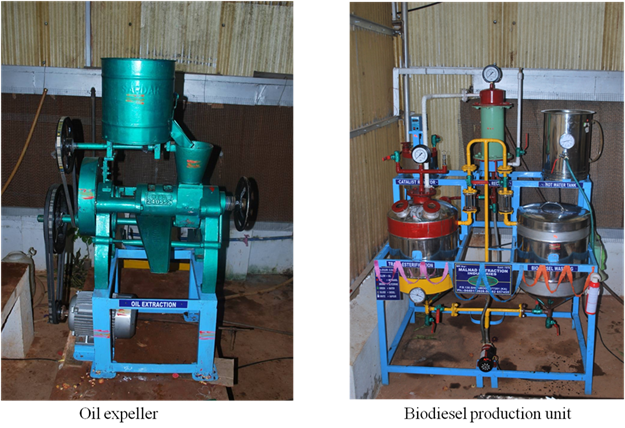
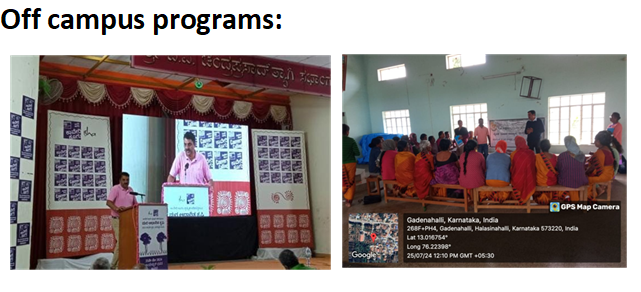


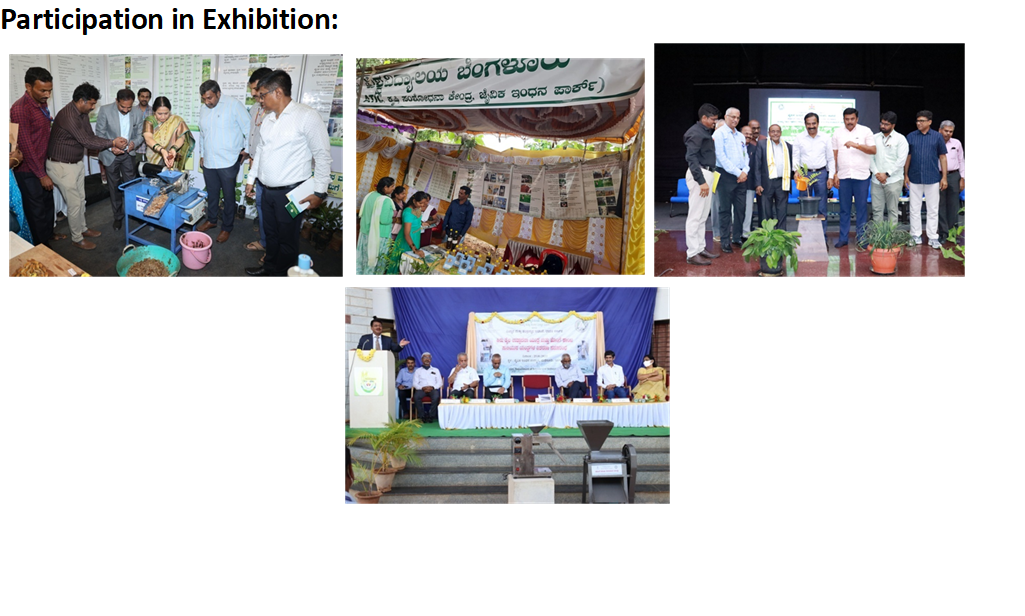

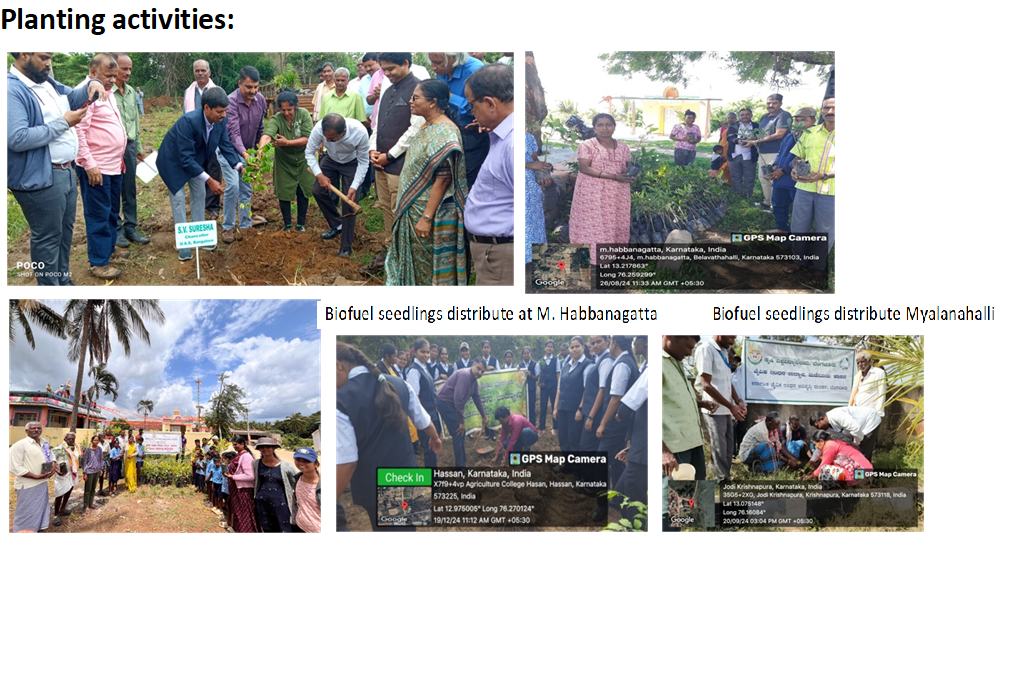
Planting of 1500 biofuel plants at Biofuel Park funded Biofuel seedlings distribute Kabbali
by HDFC CSR funds
Visitors:

Publications:



-
- Page Visitors Count:
- Last Updated: March 19, 2025
- Site Statistics
